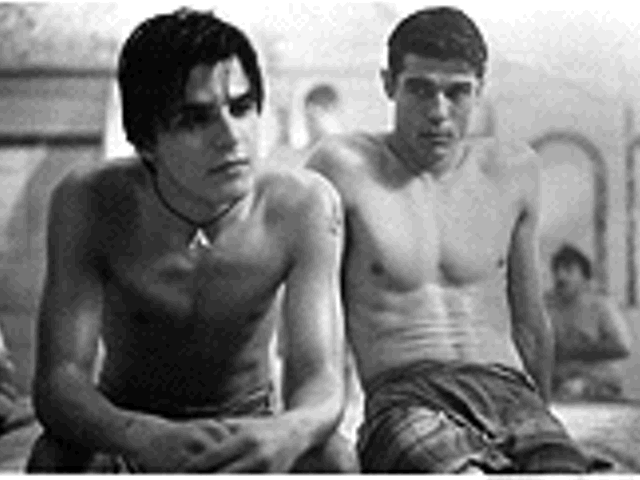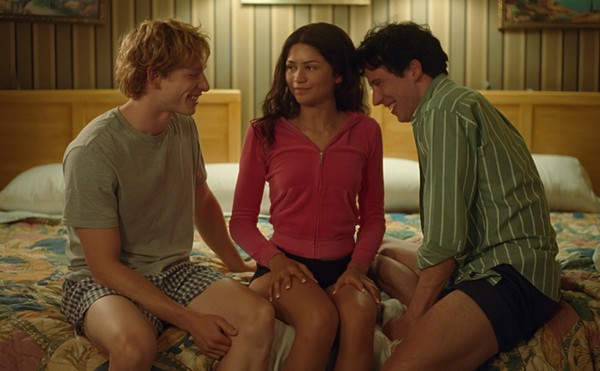· Sometime after the mid-'70s failure of his grandiose Casanova (still unavailable on video), Federico Fellini began to re-create himself as a social satirist, first with the tentative political allegory of Orchestra Rehearsal, then with the broad, misunderstood comedy of City of Women, before finally confirming his new direction in 1984 with the modest masterpiece And the Ship Sails On (Home Vision Cinema), recently reissued on video after many years in limbo. Set on a luxury ocean liner (actually a gorgeous and deliberately unreal movie set), Fellini's film is Titanic as Luis Bu ñuel might have imagined it, the story of a ship of fools — opera singers, diplomats, royalty and a charming journalist host/narrator (Freddie Jones) — en route to the funeral of a great diva. As World War I looms on the horizon, the voyagers begin to unravel and the delicate social balance goes the way of the S.S. Poseidon on New Year's Eve. Playful, lyrical, deliriously stylish and inventive, this is Fellini's irreverent attack on the limits of political influence. With a prologue that re-creates silent cinema and an "it's only a movie" flourish at the end, it's also a warm show of gratitude to his own chosen art form.
Home Vision has also just released the restored version of Fellini's Nights of Cabiria. And speaking of Fellini, isn't it about time we got to see The Voice of the Moon, the still-unreleased 1989 comedy starring Roberto Benigni?
· Imagine the young heroes and heroines of Eric Rohmer stripped of their moral underpinnings and linked to the paranoiac maneuvering of Jacques Rivette's Paris Nous Appartient, and you'll be prepared for the labyrinthine intrigue of Arnaud Desplechin's La Sentinelle (WinStar), a 1992 psychological thriller belatedly making an appearance on video. Mathias (Emmanuel Salinger, who also collaborated with Desplechin on the script) is a socially awkward medical student who moves to Paris, where he finds that a shrunken human head has been slipped into his luggage, possibly by the curious border guard who had stopped to berate him for not following his father's diplomatic career. Obsessed with his discovery, Mathias uses his developing forensic skills to uncover a mystery that gradually comes to involve his family, his friends and the whole of modern Europe. Alternately chilling and confusing, Desplechin's film is about a new, young Europe coming to terms with "the end of history" at the expense of its own past. In such a society, he suggests, paranoia may be the only logical response.
· First seen in 1966, Father (Kino on Video), the second feature from István Szab ó, Hungary's greatest contemporary director, is a little-known gem, a burst of 1960s enthusiasm and an insightful look at postwar European history (in a slightly less cynical light than La Sentinelle). The hero, a Truffautesque boy in the first half who becomes an even more Doinelian young man in the second, lives in the shadow of his father, a doctor and possible partisan hero killed at the end of World War II, and constructs imaginary images of his absent parent to fit any situation. Though the film is filled with the lively cinematic mannerisms of the time — jump-cuts, montages, handheld cameras and the whole bag of New Wave tricks — Szab ó also evokes the changing face of the political world as his young hero struggles sadly with reality. Best known in the U.S. for his 1981 Mephisto, Szab ó is a filmmaker whose work is worthy of rediscovery. Father shows insight and imagination confirmed by his later films.
Also just released from Kino are two more Eastern European rediscoveries, Andrzej Wajda's 1962 Siberian Lady Macbeth and Mikl ós Jancs ó's 1968 classic The Red and the White.
· If you've ever flipped through your premium channels late at night, you've probably seen at least a few seconds of the straight-to-video productions of Roger Corman's company New Horizons. In these knockoffs of Basic Instinct and Fatal Attraction, the male lead is often some barely remembered face from a long-canceled TV series, and the heroine is usually a stripper. Odette Springer worked as music supervisor on most of Corman's productions during the last decade and has turned her experiences working on — and her obsession with — movies like Stripped to Kill 3 and Naked Obsession into an ambitious piece of confessional documentary, Some Nudity Required (New Video/DocuRama), a film that unevenly straddles the fence between critical analysis and out-and-out voyeurism. Despite a cursory attempt at outlining the history of exploitation movies and a handful of predictable interviews (the anti- exploitation speakers offer Film Theory; directors like Jim Wynorski are visibly bored by questions that they've answered dozens of times before), it's Springer's identification with "scream queens" like Maria Ford and Julie Strain, her unabashed fascination with the "erotic thriller" genre and her willingness to acknowledge a personal taste for its excesses that keeps her film moving. Though her conclusion is little more than a pat self-help homily (having ended a bad relationship and recalled repressed memories of sexual abuse, she is last seen leading a children's choir), her path there is revealing and perceptive.
· Corman also makes his mark (indirectly, by way of clips from his 1956 It Conquered the World) on a very different kind of documentary, Death by Design (First Run Features), directed by Peter Friedman and Jean-Francois Brunet, which takes a few ideas from such innovative nonfiction films as The Atomic Cafe and Koyaanisqatsi to shed new light on an old and (if my high-school experiences are anywhere near the norm) difficult subject. Part talking-heads discussion, part playful montage, Death by Design is about cellular biology — more specifically, "cell death," the ability of cells to (willfully?) self-destruct for the good of a larger organism. Using everything from newsreel footage to clips from the work of Busby Berkeley and Harold Lloyd, the filmmakers find metaphors for amoebic life in every corner of the modern world, from the implosion of a city block to the media explosion of Times Square.
· The long romance between Dashiell Hammett and Lillian Hellman is already the stuff of legend, first set in stone by Hellman's own (not always reliable) memoirs and fleshed out by numerous biographers. Following the pair from their first meeting in the 1930s and through the political travails of the Red scare that sent Hammett to prison and produced Hellman's famous testimony before the House Un-American Activities Committee ("I cannot and will not cut my conscience to fit this year's fashions" — arguably her finest moment), the new film Dash and Lilly (A&E Home Video), produced for cable television and directed by actress Kathy Bates, jumps from one gossipy anecdote to another, throws in a few historical cameos (Bebe Neuwirth as Dorothy Parker), and generally makes the pair sound as if they're reading dust jackets from their own biographies. Jerry Ludwig's script achieves something that seemed almost impossible with the incongruous pairing of hard-drinking literary lions: It actually makes them dull — so dull that, amazingly, not even Judy Davis and Sam Shepard can revive them. For a more lively and worthy tribute, try Wim Wenders' fictionalized mystery Hammett or a trip to the library.
· Also new, for rental only: Paul Schrader's Affliction (Universal), the Academy Award-nominated Central Station (Columbia Tristar) and Roberto Benigni's extraordinary Life Is Beautiful (Miramax). Ignore the backlash: Benigni's dark, sentimental and gutsy comedy is great, courageous filmmaking.
For sale: Photographer Joel Meyer-owitz's documentary about his 87-year-old father, Pop (First Run Features); Alvin Goldstein's well-intentioned but dated The Unquiet Death of Julius and Ethel Rosenberg (Facets Video); and a repackaging of two animated features, the minor Robin Hood and the underrated Alice in Wonderland.





